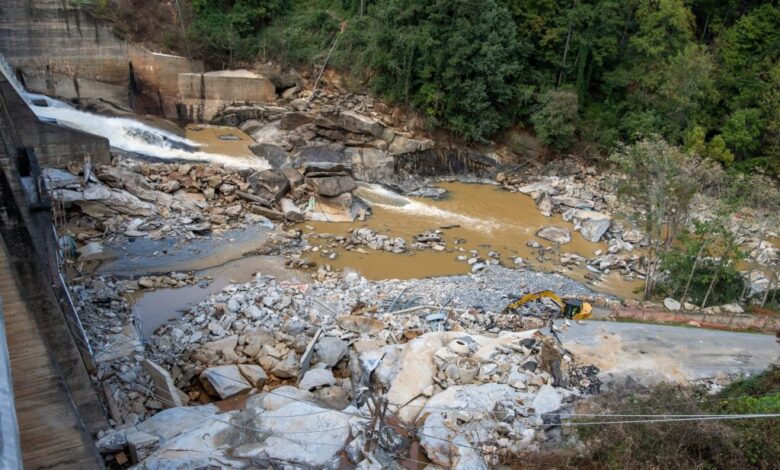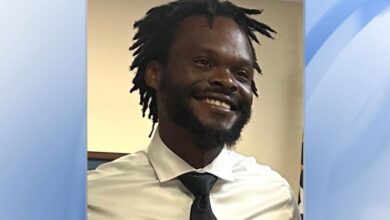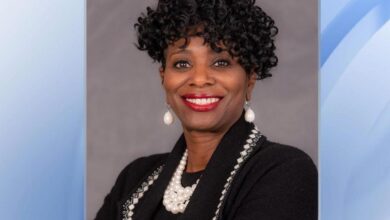Helping dentists get back to work in the wake of Helene


By Anne Blythe
Like many people and business owners in western North Carolina left to pick up the scattered pieces after the remnants of Hurricane Helene pummeled the region, dentists have had to pivot to tend to their patients’ needs.
Safe drinking water is critical to that care.
And with key components of Asheville’s municipal water system blown to bits and its feeder reservoirs suffering from tenacious turbidity, the North Carolina Board of Dental Examiners issued an emergency order on Oct. 14 waiving some facility requirements related to piped water and functioning toilets to allow oral health care providers more flexibility.
One dental board rule requires that water of a “safe, sanitary quality, from a source approved by the health officer, shall be piped under pressure, and in an approved manner, to all equipment and fixtures where the use of water is required.”
Another rule requires there to be “adequate toilet facilities” on the premises of every dental office, and they must conform to environmental standards set by the state Department of Health and Human Services.
Workers trying to fix Asheville’s water woes have been reluctant to offer a timeline for when safe, drinkable water will be freely flowing through all pipes again. Efforts are underway this week to filter out sediment causing the murkiness in the North Fork reservoir, a 350-acre lake that supplies water for nearly 80 percent of the city’s water system. Until the sediment in the reservoir settles to the bottom, those particles would be enough to clog intake pipes feeding the city’s water system.
Water problems have left a sense of uncertainty for dentists whose patients need care during a time of great upheaval in their lives. Many dentists have been able to source clean distilled water that is safe to use and have brought in portable toilets and hand-washing stations that are common in storm-ravaged areas.
But they needed the board’s OK to veer from the standard rules and regulations.
“The board’s position was ‘Let’s remove a layer of bureaucratic entanglement,’ if you will,” Bobby White, the board’s chief executive officer and legal counsel, told NC Health News this week.
Expand health care capacity
The emergency order is linked to an executive order, issued by Gov. Roy Cooper on Oct. 5, stating that North Carolina should take reasonable actions in the wake of the storm to expand health care capacity.
The dental board’s order instructs dentists operating in facilities subject to the waivers to “consult with and, where applicable, comply with” several of the Centers for Disease Control and Prevention’s published guidelines for reopening health care facilities after natural disasters.
The Association for Dental Safety also has published guidelines and a checklist for returning to work after prolonged shutdowns or reduced operations.
“Natural disasters can have long-lasting effects on communities, including dental offices,” Michelle Lee, the association’s executive director, said in an October statement. “After Hurricane Helene hit, several members wanted to make sure the dental profession had an updated document, with current guidance and resources in one place, to guide them in reopening.”
The board also directs its licensed dentists to the Alaska Division of Environmental Health’s published guidelines for building handwashing stations, and to guidelines and information offered by the U.S. Environmental Protection Agency and the North Carolina Department of Communicable Disease branch for the emergency disinfection of drinking water.
White said the impetus for cutting out some of the “bureaucratic entanglement” did not mean safety checks would be abandoned as dentists get their practices up and running again. Local boards and commissions also have procedures for ensuring that safety measures are followed.
Pivoting for patients
Asheville Dental, a longtime provider in the city, sent a blog message to its patients on Oct. 10, letting them know the office was operating on a limited schedule but had power and had “sourced clean, distilled water” but had no phone service, encouraging people to use text messaging.
WNC Dental, a family practice in Asheville, posted a message to its website from “the WNC Dental Family” announcing its plan to reopen Oct. 7.
“We deeply appreciate your patience and understanding during this time as we work to restore our services. We know that many of you are eager to reschedule appointments and return to regular care, and we are committed to doing everything we can to accommodate you as quickly as possible.”
“Please note that in the early stages of our reopening, we may need to operate with reduced hours as we balance staff needs and manage the limited resources available post-storm,” the message continues. “We ask for your continued patience and cooperation as we work through these adjustments.”
The post acknowledges that with many roads damaged during the storm, transportation could be an issue for many patients. “We’re happy to answer your dental questions over the phone as much as we can,” the post states.
The North Carolina Dental Society Foundation has established a disaster relief fund for emergency assistance for dentists.In a moving post by the American Dental Association about Helene’s impact on dentists in Florida, Georgia, South Carolina, North Carolina, Tennessee and Virginia, Jim Goodman, chief executive officer and executive director of the North Carolina Dental Society, said nearly a 1,000 dentists live in the area. At least one dental society member lost a family member during a landslide that also destroyed his home.
What’s ahead
White said he has heard that at least one dental office washed away, and that others had suffered a variety of damages in the 25-county region declared to be in a state of emergency.
One positive note board members had not anticipated is that no storm-related workforce shortage issues had been brought to their attention.
“The workforce seems to be intact,” White said.
As often is the case in times of trouble, communities come together to help each other out. Dentists have been sharing office space, White said.
High-stress events, such as those caused by Helene, can disrupt oral hygiene routines. Without clean running water, people might not brush their teeth as often. And just like during the pandemic in 2020, when there also was a contentious presidential campaign, dentists see cracked teeth, worn enamel and people complaining of TMJ, or temporomandibular joint, pain from jaw-clenching experiences.
“People get abscesses, teeth break — there are still needs,” White said.
The NC Oral Health Collaborative posted on Oct. 29 that as western North Carolina rebuilds, it’s important that accessible dental care is not overlooked.
“While oral health might not be among the most pressing needs immediately after a natural disaster like Hurricane Helene, addressing dental needs as Western North Carolina recovers will be vital for overall health and ensuring people have access to the care they deserve,” according to the organization.
Mobile clinics also have helped fill health care voids in areas where roads have been cleared.
Teledentistry, which has been an option in North Carolina since 2022, also should play a key role in recovery effort, the Oral Health Collaborative recommended.
“In the coming months, deploying more mobile dental clinics and using teledentistry whenever possible will be important in addressing the long-term oral health care needs of impacted communities,” according to the collaborative. “These access points are already vital for people in rural and underserved areas. Expanding them even further is crucial as the impacts from Helene pose additional barriers, exacerbating access and equity issues even more.”
The post Helping dentists get back to work in the wake of Helene appeared first on North Carolina Health News.











